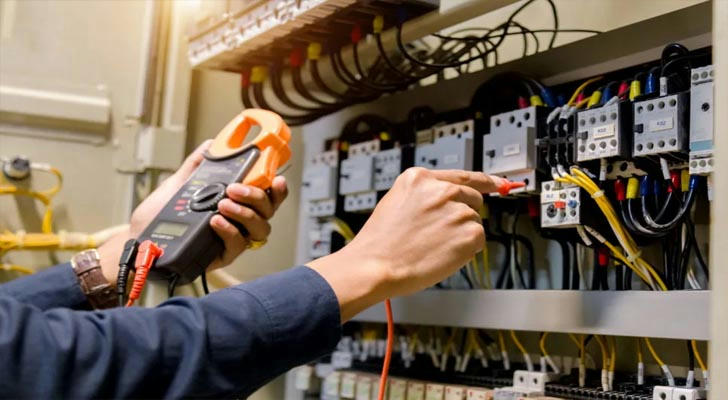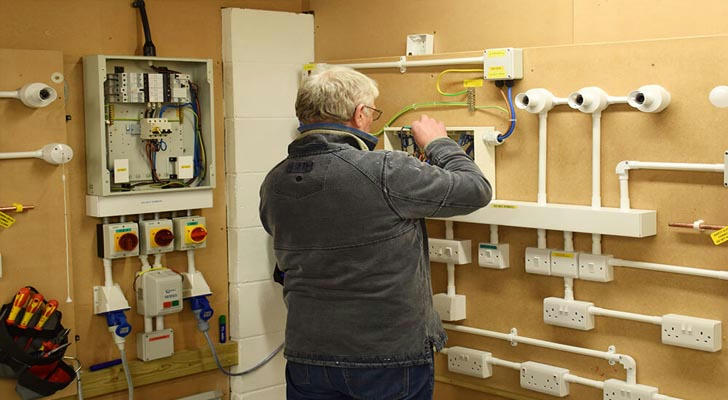Exploring the World of Electrician Courses: Powering Up Your Career
Let’s face it—electricity is everywhere. From the lights in your home to the gadgets that keep you connected, electricity powers much of our daily lives. And behind every flick of a light switch or the hum of your laptop, there’s a skilled electrician ensuring everything runs smoothly. If you’ve ever been curious about how electricity works, or even considered a career in this exciting field, an electrician course might just be your ticket to power up your future.

1. What’s It Like to Be an Electrician?
Before we dive into courses, let’s take a quick look at what being an electrician actually involves. Electricians are the unsung heroes who make sure that homes, buildings, and even entire cities stay connected to electricity. They handle everything from wiring and maintenance to installation and repair of electrical systems.
Electricians work in various industries, including construction, industrial settings, and even in homes. Some focus on residential work, while others specialize in commercial or industrial systems. It's a dynamic field that requires technical skills, problem-solving abilities, and a deep understanding of how electrical systems operate.
But here’s the cool part: anyone with the right skills and knowledge can get into this field. That’s where electrician courses come in!
2. Why Should You Consider Taking an Electrician Course?
If you’re someone who enjoys hands-on work, has a knack for problem-solving, and is curious about how things work, becoming an electrician could be a rewarding career. But just like with any profession, it requires the right training. Here’s where electrician courses become essential.
An electrician course will teach you the fundamentals of electrical theory, the proper safety protocols, and how to navigate complex electrical systems. Whether you want to work on residential wiring or deal with larger industrial systems, these courses will give you the foundation to build your career.

3. Types of Electrician Courses: From Basics to Specializations
Electrician courses are available at different levels, so you can pick the one that suits your needs, whether you’re a beginner or looking to specialize. Here’s an overview of what to expect:
Basic Electrical Theory: If you're new to the field, a basic course will cover the essentials of electricity, such as voltage, current, resistance, and circuits. You'll learn how electricity flows and the basics of wiring systems.
Residential Wiring: This type of course focuses on the wiring systems used in homes. You’ll learn how to install outlets, light fixtures, and circuit breakers while adhering to local building codes and safety standards.
Commercial and Industrial Systems: These advanced courses delve deeper into the electrical systems used in larger buildings and factories. You’ll learn how to design and maintain more complex systems, often requiring specialized tools and knowledge.
Specialized Training: Once you’ve mastered the basics, you can pursue specialized training in areas like solar power, automation, or electric vehicle charging systems, allowing you to tap into rapidly growing sectors of the industry.
The beauty of electrician courses is that they can be flexible and often available online, so you can start learning from the comfort of your own home.

4. Case Study: Ben’s Career Shift to Electrician
Let’s take a look at a real-world example. Meet Ben, a 28-year-old who spent most of his early career working in retail management. Although he liked working with people, he found himself yearning for a more hands-on job—one where he could apply his problem-solving skills and work in a more dynamic environment.
Ben had always been fascinated by how electrical systems worked. Whether it was fixing a broken light switch at home or watching electricians at work, he found himself drawn to the trade. After some research, Ben realized that becoming an electrician was more achievable than he thought, especially with the growing demand for skilled tradespeople in the market.
So, Ben enrolled in a basic electrician course at a local community college. He learned the ins and outs of electrical systems, from understanding wiring diagrams to mastering the use of tools like multimeters and wire strippers. With some additional hands-on training, he quickly gained the confidence to start working on small jobs.
A few months later, Ben moved on to a residential wiring course and got his apprenticeship with a local electrical contractor. Now, just two years after he first started, Ben is a full-fledged licensed electrician, working on residential and commercial projects in his city.
Ben’s story shows that with the right training, you can make a career change and enter a field that’s both rewarding and in-demand.
5. Key Skills You’ll Learn in Electrician Courses
While each course will offer a different level of training, most electrician programs cover these key skills:
Electrical Theory: Understanding the fundamental principles of how electricity flows is critical for any electrician. These courses teach you about circuits, resistance, voltage, and current.
Blueprint Reading: Electricians must understand blueprints and electrical diagrams to install systems accurately and safely.
Safety Procedures: Electrical work can be dangerous if not done correctly. Courses place a strong emphasis on safety, teaching proper use of tools, protective equipment, and handling emergency situations.
Troubleshooting and Problem-Solving: One of the most important skills is being able to diagnose and fix electrical issues. Whether it’s a faulty outlet or a larger system failure, you’ll learn how to troubleshoot and find solutions.
Electrical Codes and Regulations: Every electrical installation must adhere to strict local codes to ensure safety. You’ll learn about the National Electrical Code (NEC) and local building codes to keep your work compliant and safe.

6. Is Becoming an Electrician Right for You?
Becoming an electrician offers many perks, such as job stability, the potential for good pay, and the satisfaction of working on tangible, impactful projects. It’s a career that allows you to see the results of your work immediately, whether it's installing a new light fixture or wiring an entire building.
The field also offers plenty of growth opportunities, with electricians having the potential to become supervisors, business owners, or specialists in fields like renewable energy or automation.
For those who prefer hands-on work and want to solve real-world problems, electrician courses offer an exciting path to a fulfilling career.
Conclusion: Ready to Power Up Your Career?
If you’ve always been curious about how electricity works or have been looking for a career that’s both practical and in-demand, becoming an electrician might just be the perfect fit for you. With online and in-person courses available at various levels, it's easier than ever to get started. Just like Ben, you can take small steps toward transforming your career and stepping into a field full of opportunity. So why wait? Power up your learning and start your journey today! ⚡🔌
